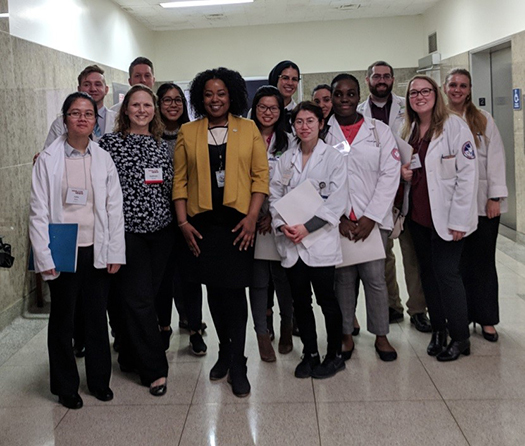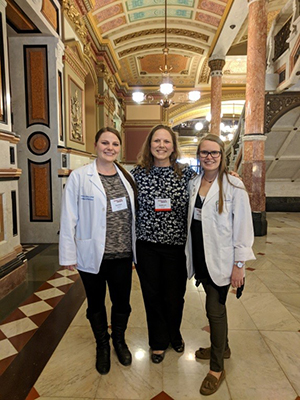Official Newsjournal of the Illinois Council of Health-System Pharmacists
You Want Me to Talk to a Legislator???
Feature Article
by Kathryn Schultz, PharmD, BCPS, BCOP, ICHP Treasurer and member of Division of Government Affairs; Michaela Murphy, PharmD Candidate 2020, Rush University Medical center, Pharmacy Technician Intern; Katie Dalton, PharmD Candidate 2019, Rush University Medical Center, Pharmacy Technician Intern
On Wednesday, March 7, 2018, about 400 pharmacists, pharmacy students, and pharmacy technicians visited Springfield, IL for “Illinois Pharmacy Legislative Day: Under the Dome” during the 100th Illinois General Assembly to speak with legislators regarding important pharmacy issues. While visiting the Capitol, we not only met with our legislators but we also listened to the House of Representatives while they were in session. It was interesting to observe the operations of our legislative process first hand and very rewarding to be able to personally educate our legislators on the impact these bills would have on our profession. The four bills of focus for 2018 are summarized below along with recommendations for your legislator on how to vote on these issues.
1) HB5442: Clogging the PMP with Unnecessary Information. This bill amends the Controlled Substance Act to require hospitals to report all controlled substances ordered and administered to patients to the Prescription Monitoring Program (PMP).
a. However, this reporting is likely unnecessary and takes away from the purpose of the PMP, which is to monitor for patients who are “provider shopping” and potentially abusing controlled substances. Patients are not able to “provider shop” within the hospital and are closely monitored by multiple disciplines (including pharmacy) for appropriate usage.
b. Adding all these inpatient orders would clog up the PMP! Recommend to your legislator to VOTE NO!
2) HB3285/SB1844: Extending Pharmacy Rights by Instituting Audit Protections. This bill amends the Illinois Insurance Code to provide fair guidelines on pharmacy audits by Pharmacy Benefit Managers (PBMs).
a. In the state of llinois, one has to undergo the rigorous process of registering as a PBM and pay $49 to start auditing pharmacies and “recouping” payment for insurance companies.
b. The purpose of a PBM should be to audit for fraud, waste, and abuse of insurance payments. However, PBMs in their current state, are completely unregulated and can charge-back payments for computer or clerical errors that had no negative impact on the patient.
c. Recommend to your legislator to VOTE YES and extend pharmacy rights by instituting audit protections.
3) HB3479/SB1888: Preserving Pharmacies in Our Communities and for Our Patients. This bill amends the Illinois Public Aid code to provide fair reimbursement within the Managed Care Organization (MCO) contracts with the state of Illinois for Medicaid.
a. Previously, Medicaid reimbursed based on a Fee-For-Services methodology. In 2016, a pilot program was started that attempts to improve health outcomes while controlling health care costs. This new program utilized contracts with MCOs to provide insurance coverage to the ~25% of the residents of Illinois who are on Medicaid.
b. Analysis of the pilot program has shown a significant reduction in the reimbursement of prescriptions dispensed and pharmacist-provided patient care services are well below acquisition costs (how much it costs the pharmacy to purchase the drug).
c. This bill provides guidance for fair reimbursement so that it is not below the acquisition cost and a fair and reasonable professional fee to be established for pharmacist-provided patient care services.
d. It also requires improved documentation of dollars handled by the MCOs (who paid who and how much) as there is currently a report that $7.1 billion dollars is unaccounted for in 2016 alone.
e. Please VOTE YES to mandate that MCOs contract with the Illinois Department of Healthcare and Family Services (HFS) to establish, maintain, and provide a fair and reasonable reimbursement rate to pharmacy providers for prescriptions dispensed and pharmacist-provided patient care services.
4) HB5747: Improving Women’s Access to Hormonal Contraception. This bill amends the Pharmacy Practice Act to allow pharmacists to provide patients with increased access to hormonal contraceptives.
a. Pharmacists with specialized training will be able to provide hormonal contraceptive patches, vaginal rings, and self-administered oral hormonal contraceptives after a patient’s medical history is screened. Access to contraceptives is crucial in reducing unintended pregnancies.
b. The contraceptives would continue to be covered by insurance.
c. Currently Oregon, California, Colorado, New Mexico, Maryland, and Hawaii all have programs that allow pharmacists to prescribe contraception. It is estimated that having pharmacists in this role could decrease the number of unintended pregnancies by 7-25%.
d. Please VOTE YES to expand women’s access to hormonal contraceptives!
So Now What?
We cannot solely rely on one day in Springfield to advocate for our profession! If you don’t know who your legislator is, look them up here:
http://www.elections.illinois.gov/DistrictLocator/DistrictOfficialSearchByAddress.aspx
Become an advocate for our profession – legislators want to hear from you! Contact them and educate them on the impact these bills will have on our profession and our patients. Most of them do not understand what a hospital pharmacist does, so invite them to see what hospital pharmacy is all about! In November 2017, we invited Representative Sonya Harper to come to Rush University Medical Center for a short visit. This was a great experience for everyone!
How Can You Set up a Visit?
First, get approval from your director of pharmacy and determine who else at the institution needs to approve the visit before arranging it. For our institution, we needed the approval of the Vice-President of the health system. We also reached out to public affairs to confirm whether they needed to be notified and we were asked to have a visitor HIPAA confidentiality form signed by the representative. We emailed the representative and worked with her local assistant to set up the time and location and relay the need for the HIPAA form to be signed.
Be patient with setting up these appointments! The representative may need to cancel and reschedule their visit, since their schedules are ever changing. We had to reschedule 3 times, but we were understanding of her need to reschedule and it finally worked out! Keep the visit SHORT! There are so many people wanting the ear of these legislators. We kept our visit to 1 hour. During that visit we showed her what interdisciplinary patient care rounds are about and how the pharmacist can have a role in these. Be sure to prep your physicians that they may encounter the legislator. We were fortunate to have a very strong advocate for pharmacists with the physician leading rounds so he even had a direct conversation with Representative Harper about the value he sees in having a pharmacist on rounds! We then took her on a tour to a pharmacy satellite and to the central pharmacy. We described how we incorporate technology into our work, our work with pharmacy technicians, and how important the technician’s role is for hospital pharmacy. Finally, we had her observe our daily huddle—essentially a 10-15 minute sign-out from day shift to evening shift of any issues and updates on drug shortages.
 What’s next? Invite more legislators to see what hospital pharmacy is all about! Representative Harper commented on how her eyes had been opened to a whole new aspect of pharmacy. We were then able to meet with her again in Springfield for Legislative Day. She recognized us and we were able to have a great conversation with her about the current bills.
What’s next? Invite more legislators to see what hospital pharmacy is all about! Representative Harper commented on how her eyes had been opened to a whole new aspect of pharmacy. We were then able to meet with her again in Springfield for Legislative Day. She recognized us and we were able to have a great conversation with her about the current bills.
We encourage you to reach out to your legislators and invite them to visit your hospital so that we can continue to educate them on the practice of hospital pharmacy. This better understanding of what pharmacists and pharmacy technicians do will be of value in the near future when there are bills that impact our practice and especially as we work to propose changes to the Pharmacy Practice Act before it sunsets.
If you are looking to become even more involved, you can also consider joining the ICHP Division of Government Affairs to be a proponent of the change for our profession!
Contents
Columns
Educational Affairs Meeting News
Professional Affairs - Call for Entries
Features
You Want Me to Talk to a Legislator???
College Connection
Midwestern University Chicago College of Pharmacy
Roosevelt University College of Pharmacy
More
Officers and Board of Directors
ICHP Pharmacy Action Fund (PAC) Contributors
Regularly Scheduled Network Meetings
Chicago Area Pharmacy Directors Network Dinner
3rd Thursday of Odd Months
5:30pm
Regularly Scheduled Division and Committee Calls
Executive Committee
Second Tuesday of each month at 7:00 p.m.
Educational Affairs
Third Tuesday of each month at 11:00 a.m.
Government Affairs
Third Monday of each month at 5:00 p.m.
Marketing Affairs
Third Tuesday of each month at 8:00 a.m.
Organizational Affairs
Fourth Thursday of each month at 12:00 p.m.
Professional Affairs
Fourth Thursday of each month at 2:00 p.m.
New Practitioner Network
Second Thursday of each month at 5:30 p.m.
Technology Committee
Second Friday of each month at 8:00 a.m.
Chicago Area Pharmacy Directors Network Dinner
Bi-monthly in odd numbered months with dates to be determined. Invitation only.


